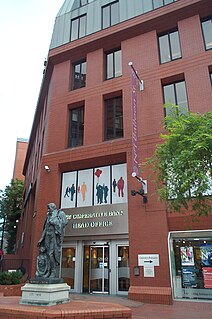
A cooperative is "an autonomous association of persons united voluntarily to meet their common economic, social, and cultural needs and aspirations through a jointly-owned and democratically-controlled enterprise". Cooperatives may include:

The domain coop is a sponsored top-level domain (sTLD) in the Domain Name System of the Internet. It is intended for the use of cooperatives, their wholly owned subsidiaries, and other organizations that exist to promote or support co-operatives.

A housing cooperative, co-op, or housing company, is a legal entity, usually a cooperative or a corporation, which owns real estate, consisting of one or more residential buildings; it is one type of housing tenure. Housing cooperatives are a distinctive form of home ownership that have many characteristics that differ from other residential arrangements such as single family home ownership, condominiums and renting.
A worker cooperative is a cooperative that is owned and self-managed by its workers. This control may be exercised in a number of ways. A cooperative enterprise may mean a firm where every worker-owner participates in decision-making in a democratic fashion, or it may refer to one in which management is elected by every worker-owner, and it can refer to a situation in which managers are considered, and treated as, workers of the firm. In traditional forms of worker cooperative, all shares are held by the workforce with no outside or consumer owners, and each member has one voting share. In practice, control by worker-owners may be exercised through individual, collective, or majority ownership by the workforce; or the retention of individual, collective, or majority voting rights. A worker cooperative, therefore, has the characteristic that each of its workers owns one share, and all shares are owned by the workers. The International organisation representing worker cooperatives is CICOPA. CICOPA has two regional organisations: CECOP- CICOPA Europe and CICOPA Americas.
A social enterprise is an organization that applies commercial strategies to maximize improvements in financial, social and environmental well-being—this may include maximizing social impact alongside profits for external shareholders.
The social economy is formed by a rich diversity of enterprises and organisations, such as cooperatives, mutuals, associations, foundations, social enterprises and paritarian institutions, sharing common values and features:

The International Co-operative Alliance (ICA) is a non-governmental co-operative federation or, more precisely, a co-operative union representing co-operatives and the co-operative movement worldwide. It was founded in 1895 to unite, represent and serve co-operatives worldwide. The Alliance maintains the internationally recognised definition of a co-operative in the Statement on the Co-operative Identity. The ICA represents 313 co-operative federations and organisations in 109 countries.
The United Kingdom is home to a widespread and diverse co-operative movement, with over 7,000 registered co-operatives which are owned by 17 million individual members and which contribute £34bn a year to the British economy. Modern co-operation started with the Rochdale Pioneers' shop in the northern English town of Rochdale in 1844, though the history of co-operation in the UK can be traced back to before 1800. The British co-operative movement is most commonly associated with The Co-operative brand which has been adopted by several large consumers' co-operative societies; however, there are many thousands of registered co-operative businesses operating in the UK. Alongside these consumers' co-operatives, there exist many prominent agricultural co-operatives (621), co-operative housing providers (619), health and social care cooperatives (111), cooperative schools (834), retail co-operatives, co-operatively run community energy projects, football supporters' trusts, credit unions and worker-owned businesses.

A consumers' co-operative is an enterprise owned by consumers and managed democratically which aims at fulfilling the needs and aspirations of their members. They operate within the market system, independently of the state, as a form of mutual aid, oriented toward service rather than pecuniary profit. Consumers' cooperatives often take the form of retail outlets owned and operated by their consumers, such as food co-ops. However, there are many types of consumers' cooperatives, operating in areas such as health care, insurance, housing, utilities and personal finance.

Cooperative banking is retail and commercial banking organized on a cooperative basis. Cooperative banking institutions take deposits and lend money in most parts of the world.
The history of the cooperative movement concerns the origins and history of cooperatives. Although cooperative arrangements, such as mutual insurance, and principles of cooperation existed long before, the cooperative movement began with the application of cooperative principles to business organization.
A student housing cooperative, also known as co-operative housing, is a housing cooperative for student members. Members live in alternative cooperative housing that they personally own and maintain. These houses are specifically designed to lower housing costs while providing an educational and community environment for students to live and grow in. They are, in general, nonprofit, communal, and self-governing, with students pooling their monetary and personal resources to create a community style home. Many student housing cooperatives share operation and governing of the house. As with most cooperatives, student housing coops follow the Rochdale Principles and promote collaboration and community work done by the members for mutual benefit.
The European Association of Co-operative Banks (EACB), is the leading trade association for the co-operative banking sector with 28 member institutions and co-operative banks located in 23 countries worldwide. As the representative of the world's largest cooperative banking cluster, the EACB is the voice of 2.914 small, regional and large member banks at European and international levels.

The Ontario Co-operative Association is a co-operative association serving co-operatives and co-op member organizations in Ontario, Canada. It is one of nine Anglophone provincial cooperative associations across Canada and collaborates with the Conseil de la coopération de l'Ontario (CCO), its Francophone counterpart in Ontario.

The National Agricultural Cooperative Federation was established in 1961 to enhance the social and economic status of its membership and to promote a balanced development of the national economy. Its role is divided into three areas: marketing and supply, banking and insurance, and extension services.
"DotCoop LLC" is the Registry of the internet namespace .coop.

Students for Cooperation (SfC) is a co-operative federation of student co-operatives across the UK, which exists to "develop and support the growing student co-operative movement". As a secondary co-op, the organisation is owned and controlled by its constituent member co-operatives.

Cooperatives Europe is the European regional office of the International Co-operative Alliance and acts for cooperative enterprises in Europe. Representing 83 member organisations from 33 European countries, across all business sectors. Cooperatives Europe promotes the cooperative business model in Europe and advocates for a level playing field between cooperatives and other forms of enterprise. Its members represent 123 million individual member cooperators owning 160.000 cooperative enterprises and providing jobs to 5.4 million European citizens.










